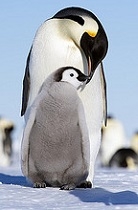Emperor Penguins Could Face Extinction from Melting Sea Ice

Emperor penguins could face extinction if temperatures continue to rise as melting sea ice will have a ripple effect on the birds' food chain, new research has warned.
At nearly four feet tall, Antarctica's largest sea bird has gained worldwide affection thanks to films like March Of The Penguins and Happy Feet, but if temperatures were to rise their numbers could fall by a third by the end of the century.
Researchers behind the first comprehensive study into the future of the species say their findings suggest that emperor penguins should be protected by the Endangered Species Act.
The study was published in the journal Nature Climate Change and is based on computer models simulating melting sea ice if temperatures in the region rise.
Too little affects food availability as it reduces the amount of marine prey available to the penguins, whereas too much forces adults to travel further to forage for food to bring back to their chicks.
Disappearing ice affects the fish, squid and krill the penguins eat, which in turn feed on zooplankton and phytoplankton that grow on the ice.
If the ice goes, so will the plankton - causing a ripple effect through the food web that could starve the various species penguins rely on for food.
Dr Stephanie Jenouvrier, of Woods Hole Oceanographic Institution, Massachusetts, and colleagues analysed population trends for the 45 known emperor penguin colonies, taking account of the various sea ice conditions forecast.

The study showed although year to year growth rates are mostly positive until 2040, all colonies will begin to experience falls by 2080, and predicted that two thirds of colonies will shrink to less than half of their present size by 2100.
The study is based on climate change scientists' predictions, although these are disputed by some critics of theories of man-made climate change.
'Dynamics differ among colonies, but by 2100 all populations are projected to be declining,' said Dr Jenouvrier.
'At least two thirds are projected to have declined by more than 50 per cent from their current size. The global population is projected to have declined by at least 19 per cent.
'Because criteria to classify species by their extinction risk are based on the global population dynamics, global analyses are critical for conservation.'
Just one emperor penguin population has been intensively studied, the colony in Terre Adelie in East Antarctica, at the northern part of the species range which has been followed for five decades.
Dr Jenouvrier said: 'A detailed analysis of the effects of climate change on this colony projected a pronounced decline by the end of this century.
'However, 45 colonies are known from direct and satellite observations. Most of these colonies have never been, and probably never will be visited by humans.'
Unlike other sea birds, Emperor penguins breed and raise their young almost exclusively on sea ice.
If the ice breaks up and disappears early into the breeding season, massive breeding failure will occur.
There is already a huge death rate at the breeding stages because only half of chicks live to the end of the breeding season and then only half the survivors live to see another year.
The Dion Islet penguin colony, close to the West Antarctic peninsula, had a thriving population of 250 breeding pairs in the 70s, but that number was reduced just 20 in 1999 and by 2009, it was wiped out entirely.
Dr Jenouvrier added: 'We propose the Emperor penguin is fully deserving of Endangered status due to climate change, and can act as an iconic example of a new global conservation paradigm for species threatened by future climate change.'
*Original stroy The Daily Mail via Google News (search term: sea)
*Thumnail image courtesy of: Flickr/Christopher Michel
* Image: Flickr/Christopher Michel (C.C 2.0)![]()

Post your comment
You cannot post comments until you have logged in.
Login to post a commentComments
No one has commented on this page yet.
RSS feed for comments on this page | RSS feed for all comments